新概念英语学习计划表怎么写.doc
利用艾宾浩斯记忆曲线背默新概念英语计划表-超实用

五 5月25日 第Ⅰ册31课 第29课 第25课 第19课 第3课 五 6月8日 第Ⅰ册59课 第57课 第53课 第47课 第31课 五 6月22日 第Ⅰ册87课 第85课 第81课 第75课
六 5月26日 第Ⅰ册33课 第31课 第27课 第21课 第5课 六 6月9日 第Ⅰ册61课 第59课 第55课 第49课 第33课 六 6月23日 第Ⅰ册89课 第87课 第83课 第77课
二 6月5日 第Ⅰ册53课 第51课 第47课 第41课 第25课 二 6月19日 第Ⅰ册81课 第79课 第75课 第69课
三 6月6日 第Ⅰ册55课 第53课 第49课 第43课 第27课 三 6月20日 第Ⅰ册83课 第81课 第77课 第71课
四 6月7日 第Ⅰ册57课 第55课 第51课 第45课 第29课 四 6月21日 第Ⅰ册85课 第83课 第79课 第73课
背默 复习
第Ⅰ册1课
日期
六 5月19日
日 5月20日 第Ⅰ册21课 第19课 第15课 第9课
一 5月21日 第Ⅰ册23课 第21课 第17课 第11课
二 5月22日 第Ⅰ册25课 第23课 第19课 第13课
三 5月23日 第Ⅰ册27课 第25课 第21课 第15课
四 5月24日 第Ⅰ册29课 第27课 第23课 第17课 第1课
日 5月27日 第Ⅰ册35课 第33课 第29课 第23课 第7课 日 6月10日 第Ⅰ册63课 第61课 第57课 第51课 第35课 日 6月24日 第Ⅰ册91课 第89课 第85课 第79课
一 5月28日 第Ⅰ册37课 第35课 第31课 第25课 第9课 一 6月11日 第Ⅰ册65课 第63课 第59课 第53课 第37课 一 6月25日 第Ⅰ册93课 第91课 第87课 第81课
新概念2册学习计划
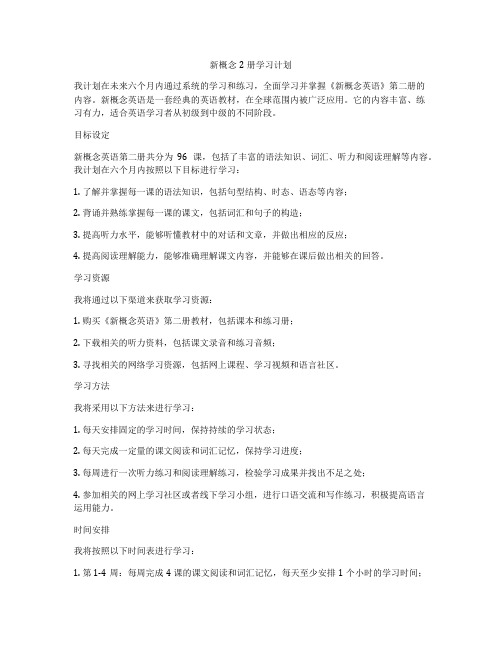
新概念2册学习计划我计划在未来六个月内通过系统的学习和练习,全面学习并掌握《新概念英语》第二册的内容。
新概念英语是一套经典的英语教材,在全球范围内被广泛应用。
它的内容丰富、练习有力,适合英语学习者从初级到中级的不同阶段。
目标设定新概念英语第二册共分为96课,包括了丰富的语法知识、词汇、听力和阅读理解等内容。
我计划在六个月内按照以下目标进行学习:1. 了解并掌握每一课的语法知识,包括句型结构、时态、语态等内容;2. 背诵并熟练掌握每一课的课文,包括词汇和句子的构造;3. 提高听力水平,能够听懂教材中的对话和文章,并做出相应的反应;4. 提高阅读理解能力,能够准确理解课文内容,并能够在课后做出相关的回答。
学习资源我将通过以下渠道来获取学习资源:1. 购买《新概念英语》第二册教材,包括课本和练习册;2. 下载相关的听力资料,包括课文录音和练习音频;3. 寻找相关的网络学习资源,包括网上课程、学习视频和语言社区。
学习方法我将采用以下方法来进行学习:1. 每天安排固定的学习时间,保持持续的学习状态;2. 每天完成一定量的课文阅读和词汇记忆,保持学习进度;3. 每周进行一次听力练习和阅读理解练习,检验学习成果并找出不足之处;4. 参加相关的网上学习社区或者线下学习小组,进行口语交流和写作练习,积极提高语言运用能力。
时间安排我将按照以下时间表进行学习:1. 第1-4周:每周完成4课的课文阅读和词汇记忆,每天至少安排1个小时的学习时间;2. 第5-8周:每周加大听力和阅读理解练习的时间,每周至少安排2个小时的学习时间;3. 第9-12周:开始进行口语交流和写作练习,每周安排2-3个小时的学习时间;4. 第13-16周:整合前期学习成果,进行模拟考试并总结学习经验;5. 第17-24周:复习并巩固前期学习内容,着重练习听力和阅读理解。
预期结果通过以上的学习计划和努力,我期望在六个月内达到以下目标:1. 掌握《新概念英语》第二册的全部内容,包括语法知识、词汇、听力和阅读理解;2. 能够流利地表达日常生活中的常见话题,包括自我介绍、购物、旅行等;3. 能够独立进行英语听力和阅读练习,并能够准确理解相关内容。
2023年新概念英语学习计划_1

2023年新概念英语学习计划2023年新概念英语学习计划1听课要求1.认真作好课堂笔记,课堂笔记是系统复习的重要资料;2.每篇课文的课后练习需要严格按照要求完成,以保证听课效果;3.第三册的练习册,是按照国际标准的考试系统统计的,学员应抽时间,巩固所学知识。
第1周1.新概念英语第一册词汇为857个,第二册1126个自我检查词汇量是否达到要求。
如果已经达到要求可以直接进入第三册的学习,否则,需要安排1周时间背诵词汇(建议结合大学六级词汇),作好听课前的准备;2.根据教材给出的测试题,作一个自我测试工,了解自己在听说读写四方面的能力:(1)整体能力是否已经达到了学习要求;(2)对四方面能力的强弱做到心中有数,学习过程中加大对弱项的练习。
第2-19周听课要求1.课前预习要求能够背诵下一课的生词并复习上一课单词;2.根据录音朗读课文,每天至少坚持2个小时以上;3.完成教材的课后练习,不懂部份及时向老师反映解决;4.完成教师要求的背诵内容,听磁带、听写__精彩段落;5.开始学习初步的写作、翻译;6.学习英语地道表达方法、增强语言感觉能力,能用“英语思维”思考问题。
备注1.第三册学员应听懂纯英文课,听、说、读、写水平进一步强化;2.第19、37课时的学习完成后,建议安排阶段学习;3.全部课程约束之后,安排时间进行总复习,根据课堂笔记,复习重点内容;4.完成新概念英语第三册学习的学员可以通过针对性的考试技巧的培训,参加大学英语六级、研究生入学考试、雅思和托福考试等。
新概念英语第三册是学习英语的提高阶段,全书共有60课,每篇课文比第二册课文要长得多,大约平均每篇300字左右。
课文还是以故事体的记人叙事为主,但第三册课文中也包含了一些日常生活紧密相连的说明文和少量的散文。
第三册主要全面提高学生的听、说、读、写的能力。
新概念英语第三册出现新单词大约1900个左右,加上教师上课补充的词汇,学生可以掌握3000个左右的新单词,因此学生在学习完第三册后词汇可以达到6000个左右,经过一定的训练可以参加全国大学英语六级或相当水平的测试。
新概念英语 学习计划

新概念英语学习计划IntroductionNew Concept English is a series of English language textbooks and multimedia resources developed by Louis George Alexander, a British linguist and teacher, which is widely used in English education in China, and many other countries. The series covers a range of levels, from beginner to advanced, and is designed to help learners improve their communication skills in English. This study plan is intended for students who are studying New Concept English, and aims to provide guidance on how to effectively use the textbooks and other resources to achieve their language learning goals.GoalsThe primary goal of this study plan is to help students develop their English language skills, including listening, speaking, reading, and writing. In addition, the plan aims to help students build a strong foundation in English grammar and vocabulary, and develop their ability to use English in a variety of real-life situations.Study ScheduleThe study plan is divided into four main sections, corresponding to the four levels of the New Concept English series: Elementary, Pre-Intermediate, Intermediate, and Advanced. Each section provides a detailed schedule for studying the relevant textbook, as well as additional resources and activities to support learning. In addition, the plan includes recommendations for practicing listening, speaking, reading, and writing skills, and suggests ways to integrate English learning into everyday life.Elementary LevelThe Elementary level of New Concept English is designed for beginner learners who have little or no prior knowledge of English. The primary goal of this level is to introduce learners to basic conversational English and help them develop their ability to understand and use simple vocabulary and grammar. The following is a suggested study schedule for the Elementary level:1. Study the New Concept English 1 textbook, including all 60 lessons, over a period of six months.2. Complete all the exercises and activities in the textbook, and review the material regularly to reinforce learning.3. Practice listening and speaking skills by listening to the accompanying audio recordings and repeating the dialogues and exercises.4. Use flashcards to memorize new vocabulary and practice using the words in sentences.5. Engage in daily conversation practice with a language partner or tutor, focusing on using the vocabulary and grammar from the textbook in real-life situations.Pre-Intermediate LevelThe Pre-Intermediate level of New Concept English is designed for learners who have completed the Elementary level, or have some prior knowledge of English. The primary goal of this level is to help learners expand their vocabulary and grammar skills, and develop their ability to understand and use more complex language. The following is a suggested study schedule for the Pre-Intermediate level:1. Study the New Concept English 2 textbook, including all 96 lessons, over a period of eight months.2. Complete all the exercises and activities in the textbook, and review the material regularly to reinforce learning.3. Practice listening and speaking skills by listening to the accompanying audio recordings and engaging in conversations with native speakers.4. Use a variety of resources, such as online language learning platforms and English language websites, to expand vocabulary and practice grammar.5. Engage in regular reading practice by reading English books, articles, and news, and practicing summarizing and discussing the material.Intermediate LevelThe Intermediate level of New Concept English is designed for learners who have completed the Pre-Intermediate level, or have a good grasp of basic English. The primary goal of this level is to help learners develop their ability to use English in a variety of situations, and prepare them for more advanced language learning. The following is a suggested study schedule for the Intermediate level:1. Study the New Concept English 3 textbook, including all 72 lessons, over a period of six months.2. Complete all the exercises and activities in the textbook, and review the material regularly to reinforce learning.3. Practice listening and speaking skills by listening to the accompanying audio recordings and engaging in conversations with native speakers, focusing on fluency and pronunciation.4. Use a variety of resources, such as English language podcasts, TV shows, and movies, to improve listening skills and expose yourself to different accents and dialects.5. Engage in regular writing practice by writing essays, emails, and journal entries in English, and seeking feedback from a language partner or tutor.Advanced LevelThe Advanced level of New Concept English is designed for learners who have completed the Intermediate level, or have a high level of proficiency in English. The primary goal of this level is to help learners refine their language skills and prepare them for more advanced language learning or professional use of English. The following is a suggested study schedule for the Advanced level:1. Study the New Concept English 4 textbook, including all 60 lessons, over a period of six months.2. Complete all the exercises and activities in the textbook, and review the material regularly to reinforce learning.3. Engage in regular language exchange or conversation practice with native speakers to improve fluency and accuracy in speaking.4. Use authentic materials, such as English literature, academic articles, and professional texts, to expand vocabulary and improve reading and writing skills.5. Use online language learning platforms and resources to focus on specific areas of interest or language use, such as business English, academic English, or exam preparation. ConclusionThis study plan is intended to provide guidance and suggestions for students who are studying New Concept English, and can be adapted to suit individual learning styles and goals. In addition to following the study schedule, it is important for students to actively engage in English learning and to seek out opportunities to practice and use the language in real-life situations. By following this study plan and taking a proactive approach to language learning, students can make significant progress in developing their English language skills and achieving their language learning goals.。
新概念英语学习时间计划

新概念英语学习时间计划IntroductionLearning English is an important goal for many people all over the world. It can open up a world of opportunities, make travel easier, and help you connect with people from different cultures. However, it can also be a challenging language to learn, especially for non-native speakers. That's why having a solid study plan is essential to making progress and achieving your language learning goals. In this article, we will discuss a comprehensive study plan for learning English using the New Concept English series, a popular and effective English language learning program.Setting GoalsThe first step in any successful study plan is to set clear and achievable goals. Before you start studying, take some time to think about what you hope to accomplish with your English language learning. Do you want to improve your speaking and listening skills for travel or work? Are you preparing for an English language exam? Or are you simply looking to expand your vocabulary and improve your overall fluency? Once you have a clear idea of your goals, you can tailor your study plan to meet your specific needs.Choosing the Right MaterialsThe New Concept English series is a great choice for English language learners of all levels. The series consists of three separate volumes, each of which focuses on different language skills. The first volume, "First Things First," is designed for beginner learners and focuses on basic grammar, vocabulary, and sentence structure. The second volume, "Practice and Progress," is aimed at intermediate learners and provides more in-depth practice with grammar and vocabulary. The third volume, "Developing Skills," is for advanced learners and focuses on improving reading, writing, and listening skills. Depending on your current level of proficiency, you can choose the appropriate volume to start with. If you're not sure which volume to start with, you can take a placement test to assess your language skills and determine the best starting point for your studies.Creating a Study ScheduleOnce you have your goals and materials in place, it's time to create a study schedule. Consistency is key when it comes to language learning, so try to set aside a specific time each day for studying English. Whether it's in the morning, afternoon, or evening, find a time that works best for you and stick to it. The New Concept English series is designed to be used over a period of several months, so you can plan to study for a set amount of time each day or week, depending on your schedule and the pace at which you want to progress. For example, you might decide to study for 30 minutes to an hour each day, or you might prefer to study for longer periods a few times a week. Whatever schedule you choose, the important thing is to make regular, consistent progress.Setting Weekly and Monthly GoalsIn addition to setting overall language learning goals, it can be helpful to set weekly and monthly goals to track your progress and keep yourself motivated. For example, you might set a goal to complete a certain number of lessons or units from the New Concept English series each week or month. You can also set specific language skill goals, such as mastering a certain number of new vocabulary words or completing a certain number of grammar exercises. By breaking your overall language learning goals into smaller, manageable chunks, you can stay focused and motivated as you work through the series.Practicing Speaking and ListeningIn addition to working through the New Concept English series, it's important to practice your speaking and listening skills as much as possible. If you have access to native English speakers, try to engage in regular conversations to practice your speaking and listening skills. If you don't have access to native speakers, there are still plenty of ways to practice. You can listen to English-language radio or podcasts, watch English-language movies and TV shows, or find language exchange partners online to practice speaking with. The more you can immerse yourself in English and practice using the language in real-life situations, the faster you will improve your speaking and listening skills.Reviewing and TestingRegular review and testing are important components of any successful language learning plan. As you work through the New Concept English series, be sure to review previous lessons and units regularly to reinforce your learning and ensure that you are retaining the material. You can also create your own review tests or quizzes to test your knowledge and identify areas for improvement. Additionally, consider taking practice exams or other language proficiency tests to gauge your progress and identify areas where you need to focus more attention. The New Concept English series includes plenty of review exercises and tests, but it's always a good idea to create your own additional review materials as well. Seeking Feedback and SupportFinally, don't hesitate to seek feedback and support from others as you work through the New Concept English series. If you have access to a language tutor, ask them to provide feedback on your progress and help you identify areas for improvement. If you don't have a tutor, consider joining a language learning community or finding a language learning partner to exchange feedback and support. Getting regular feedback from others and having a support network can be incredibly helpful for staying motivated and making progress with your language learning.ConclusionThe New Concept English series is a valuable resource for English language learners, and by following a comprehensive study plan, you can make steady progress and achieve yourlanguage learning goals. By setting clear goals, creating a study schedule, practicing speaking and listening, reviewing and testing, and seeking feedback and support, you can create an effective study plan that will help you improve your English language skills. With dedication and consistent effort, you can use the New Concept English series to increase your fluency, expand your vocabulary, and gain confidence in using English both in and out of the classroom. Good luck with your studies!。
整理新概念英语学习计划怎么写.doc

新概念英语学习计划怎么写很多小伙伴学习新概念英语都没有好的学习计划,导致学习英语的效果不明显。
为此,以下是我分享给大家的新概念英语学习计划,希望可以帮到你!新概念英语学习计划早上6点-8点:一日之计在于晨,对一般人来说,疲劳已消除,头脑最清醒,体力亦充沛,是学习的黄金时段早上8点-9点:据试验结果显示,此时人的耐力处于最佳状态,正是接受各种“考验”的好时间可安排难度大的攻坚内容上午9点-11点:试验表明这段时间短期记忆效果很好对“抢记”和马上要考核的东西进行“突击”,可事半功倍正午13点-14点:饭后人易疲劳,夏季尤其如此休息调整一下,养精蓄锐,以利再战最好休息,也可听轻音乐但午休切莫过长下午15点-16点:调整后精神又振,试验表明,此时长期记忆效果非常好可合理安排那些需“永久记忆”的东西傍晚17点-18点:试验显示这是完成复杂计算和比较消耗脑力作业的好时间这段时间适宜做复杂计算和费劲作业新概念英语学习建议多听:想一想小孩子怎么学习语言的,是不是在大人的环境里浸泡很长一段时间,一年甚至两年才开口。
中小学生和承认的智力发育比小孩子要成熟的多,但是仍然需要多听,多输入。
现在的小学英语教育已经经常会有听的任务,但是相对于写还是少得可怜。
一篇文章不听10遍8遍的怎么可以体会单词的发音,句子的正确表达呢?而且要养成英语听力的习惯,比如吃早饭的时候听力3遍,回家做作业之后听2遍,睡觉之前再听两遍,并固化成习惯。
多说:背其实是说最下策的一种方式。
还有其他的可以参考,简单一点的看着中文说英文,看着英文说中文。
难一点的自己总结关键人物,地点,和关键动词名词,做一个思维导图,看着思维导图自己讲故事。
这个过程可以用录音机录下来,自己听,或者交给老师听,说的不好的地方反复说反复优化。
多总结:不管是上过语法课,听力课,或者词汇可,语音课,课后都要总结自己上课中学到了什么,自己可不可以找到同义词,反义词,或者自己使用学过的单词造句,举一反三。
新概念3册学习计划
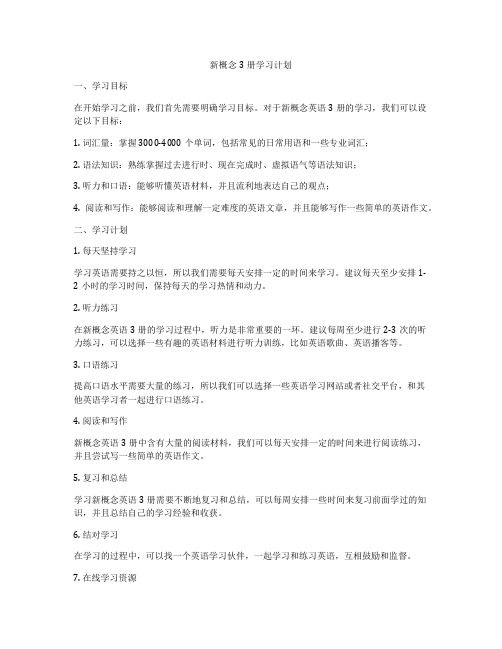
新概念3册学习计划一、学习目标在开始学习之前,我们首先需要明确学习目标。
对于新概念英语3册的学习,我们可以设定以下目标:1. 词汇量:掌握3000-4000个单词,包括常见的日常用语和一些专业词汇;2. 语法知识:熟练掌握过去进行时、现在完成时、虚拟语气等语法知识;3. 听力和口语:能够听懂英语材料,并且流利地表达自己的观点;4. 阅读和写作:能够阅读和理解一定难度的英语文章,并且能够写作一些简单的英语作文。
二、学习计划1. 每天坚持学习学习英语需要持之以恒,所以我们需要每天安排一定的时间来学习。
建议每天至少安排1-2小时的学习时间,保持每天的学习热情和动力。
2. 听力练习在新概念英语3册的学习过程中,听力是非常重要的一环。
建议每周至少进行2-3次的听力练习,可以选择一些有趣的英语材料进行听力训练,比如英语歌曲、英语播客等。
3. 口语练习提高口语水平需要大量的练习,所以我们可以选择一些英语学习网站或者社交平台,和其他英语学习者一起进行口语练习。
4. 阅读和写作新概念英语3册中含有大量的阅读材料,我们可以每天安排一定的时间来进行阅读练习,并且尝试写一些简单的英语作文。
5. 复习和总结学习新概念英语3册需要不断地复习和总结,可以每周安排一些时间来复习前面学过的知识,并且总结自己的学习经验和收获。
6. 结对学习在学习的过程中,可以找一个英语学习伙伴,一起学习和练习英语,互相鼓励和监督。
7. 在线学习资源除了教科书之外,还可以利用一些在线学习资源,比如英语学习网站、英语学习APP等,丰富自己的学习方式和途径。
8. 学习环境建议在学习英语的时候营造一个良好的学习环境,比如安静舒适的学习空间,良好的心态和态度,有助于提高学习效果。
三、学习方法在学习新概念英语3册的过程中,我们可以尝试一些学习方法,比如划重点、背单词、模仿口音等。
此外,还可以借助教学视频、英语学习网站等资源,提高学习的效率和趣味性。
四、总结以上是一份关于新概念英语3册的学习计划,希望能够帮助学生更好地提高他们的英语水平。
2024年新概念英语自学计划表(5篇)

2024年新概念英语自学方案表(5篇)新概念英语自学方案表篇一听力要求1.认真做好课堂笔记,是系统复习的重要材料;2.每篇课文的课后练习都需要严格按照要求完成,保证听力效果;3.尽可能花时间制作匹配的练习册,稳固所学知识。
第一周1.新概念英语第一册有857个单词,检查词汇是否符合要求。
假设你已经到达要求,你可以直接去上课的第二卷。
否那么需要安排1周背诵词汇(结合背诵四级词汇)并做好上课前的准备。
2.根据课本给出的试题,做一个自我测试,理解自己的听、说、读、写才能:(1)整体才能是否到达学习要求;(2)意识到四种才能的优缺点,在学习过程中加大对弱点的训练。
第2-19周听力要求1.课前准备要求可以背诵下一课的生词,复习上一课的单词;结合课堂上的语法要求和【【关键词】:^p 】:组,可以复述文章大意;2.根据录音读课文,每天坚持至少一小时;3.完成教材要求的课后练习,并及时向教师汇报解决方案;4.完成教师要求的背诵,根据磁带听写课文内容;5.掌握教师教的根本语法和词汇短语的用法;6.课堂上踊跃发言,让教师有时机纠正你的错误,这将有助于进步你的英语口语。
评论1.25班和55班学习完成后,建议安排阶段复习;2.所有课时完毕后,安排时间进展总复习,根据课堂笔记复习重点内容;3.课本第四单元的新单词和语法在前面的课程中已经通过同义词、近义和相似联想的教学进展理解释。
据统计,新概念教材第二册词汇量为1126个,而课堂实际所需词汇量已到达3000个;4.第二册学生要在40节课后理解纯英语教学,可以写简单的字母,听说读写才能显著进步;5.完成新概念英语第二册学习内容的学生,可以通过有针对性的考试技能训练,参加四级考试。
新概念英语第二册是学习英语的根底部分。
全书共96课,每篇课文由150字左右的短篇故事组成。
这篇课文讲故事,容易学。
每篇课文都有不同的侧重点和语法知识点,但整篇课文在语法知识上是连接的、全面的,形成了一个独特的、有新概念的英语语法体系。
英语学习计划表

英语(yīnɡ yǔ)学习方案(fāng àn)表英语(yīnɡ yǔ)学习方案(fāng àn)表1)大一(dà yī):刚进大学,有大量的新鲜事物有待探索(remaintoe某plore),很多人把大量的时间花在左顾右盼上,但是有一局部同学,他们目标坚决,内心成熟,他们已经拿起“新概念〞,在校园里晨读起来。
如果大学有一件事情值得你坚持四年,那么它就是早读。
第一学期,从高中细节的语法学习、题海轰炸过渡到大学兴趣为主、阅读为王的学习方式,你可能要花点时间适应;之后,第二学期你就可以开始准备四级,用一个月的时间把词汇解决。
然后你要做一些阅读和真题,轻松地就能通过四级考试。
作为大学中一个最简单的考试,它只是给你些许开始的信心。
如果认为自己根底稍弱一些的,可以先系统的学习一下新概念二册或初、中级阅读,打下根底,再过考试。
2)大二:你内心清楚自己的目标是六级,但是这个时候,你可能会对听力口语产生一些兴趣,是的,你应该找出几盒有难度进阶的磁带来练听力。
有几个原那么必须遵守:一、不看原文〔不把听力变成阅读〕;二、在安静的环境下认真听;三、反复听相同的东西。
第一盒磁带可能会让你生不如死,过了一个月才大致听懂,没有关系,第二盒磁带可能就只需要20天了,第三盒磁带可能只需要15天,当听到第5盒磁带再回头听第一盒时,就会有想打自己耳光的感觉〔couldhavekickedyourself〕,怪自己为什么当初听不懂这么简单的内容。
大二的时候,英语学习观似乎有些变化,虽然你通过努力可能也过了六级考试,但是你发现一切知识都要应用,六级考题对于你来说更多的是一种表达方式。
这个时候,系统学习一下“新概念三〞对于增强自己的表达法、深入了解英文行文规那么很有帮助。
至于口语,找一个志同道合的人,加上新三的强大知识库,每天练习,有三个月,就会有突飞猛进的感觉。
推荐同学们用能飞英语网的能飞英语视听学习机软件来进行听力和口语练习。
学英语计划表
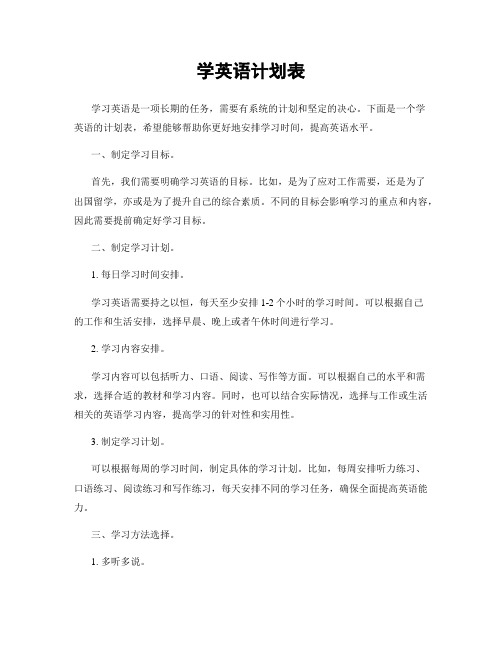
学英语计划表学习英语是一项长期的任务,需要有系统的计划和坚定的决心。
下面是一个学英语的计划表,希望能够帮助你更好地安排学习时间,提高英语水平。
一、制定学习目标。
首先,我们需要明确学习英语的目标。
比如,是为了应对工作需要,还是为了出国留学,亦或是为了提升自己的综合素质。
不同的目标会影响学习的重点和内容,因此需要提前确定好学习目标。
二、制定学习计划。
1. 每日学习时间安排。
学习英语需要持之以恒,每天至少安排1-2个小时的学习时间。
可以根据自己的工作和生活安排,选择早晨、晚上或者午休时间进行学习。
2. 学习内容安排。
学习内容可以包括听力、口语、阅读、写作等方面。
可以根据自己的水平和需求,选择合适的教材和学习内容。
同时,也可以结合实际情况,选择与工作或生活相关的英语学习内容,提高学习的针对性和实用性。
3. 制定学习计划。
可以根据每周的学习时间,制定具体的学习计划。
比如,每周安排听力练习、口语练习、阅读练习和写作练习,每天安排不同的学习任务,确保全面提高英语能力。
三、学习方法选择。
1. 多听多说。
提高英语听力和口语能力,需要多听多说。
可以选择一些地道的英语听力材料,比如英文电影、纪录片、英语广播等,同时也可以参加英语角或者找外国朋友练习口语。
2. 多读多写。
提高英语阅读和写作能力,需要多读多写。
可以选择一些适合自己水平的英语读物,比如英语小说、英文报纸、英语杂志等,同时也可以多写一些英语日记、作文或者翻译练习,提高写作水平。
四、学习效果检测。
1. 定期测试。
可以定期进行英语水平测试,比如每月进行一次英语水平测试,检测自己的学习效果,及时发现问题并进行调整。
2. 反馈和总结。
学习英语需要不断总结和反馈,可以定期与老师或者学习伙伴进行交流,分享学习心得和体会,相互帮助,共同进步。
五、学习心态调整。
学习英语是一项长期的任务,需要有坚定的决心和乐观的心态。
遇到困难和挫折时,要保持耐心和信心,相信自己一定能够取得进步。
《新概念英语》第一册(艾宾浩斯遗忘曲线)学习计划表

*49~50 *57~58 *61~62 *63~64 第39天 77~78 *19~20 *49~50 *63~64 *71~72 *75~76 *77~78 第46天 91~92 *33~34 *63~64 *77~78 *85~86 *89~90 *91~92 第53天 105~106 *47~48 *77~78 *91~92 *99~100 *103~104 *105~106 第60天 119~120 *61~62 *91~92 *105~106 *113~114 *117~118 *119~120
第64天 127~128 *69~70 *99~100 *113~114 *121~122 *125~126 *127~128 第71天 141~142 *83~84 *113~114 *127~128 *135~136 *139~140 *141~142 第78天 *97~98 *127~128 *141~142 第85天 *111~112 *141~142 第92天 *125~126 第99天 *139~140
第65天 129~130 *71~72 *101~102 *115~116 *123~124 *127~128 *129~130 第72天 143~144 *85~86 *115~116 *129~130 *137~138 *141~142 *143~144 第79天 *99~100 *129~130 *143~144 第86天 *113~114 *143~144 第93天 *127~128 第100天 *141~142
带星号的表示复习第10天第11天第12天第13天第14天第15天第16天第17天第18天第19天第20天第21天第22天第23天第24天第25天第26天第27天第28天第29天第30天第31天第32天第33天第34天第35天第36天第37天第38天第39天第40天第41天第42天65666768697071727374757677786970717273747576777879808182717273747576777879808182838485868788899091929394959697982728293031323334353637383940575859606162636465666768697071727374757677787980818283847980818283848586878889909192838485868788899091929394959685868788899091929394959697989910010110210310410510610710810911011111241424344454647484950515253547172737475767778798081828384858687888990919293949596979893949596979899100101102103104105106979899100101102103104105106107108109110991001011021031041051061071081091101111121131141151161171181191201211221231241251265556575859606162636465666768858687888990919293949596979899100101102103104105106107108109110111112107108109110111112113114115116117118119120111112113114115116117118119120121122123124113114115116117118119120121122123124125126127128129130131132133134135136137138139140697071727374757677787980818299100101102103104105106107108
新概念2学习计划
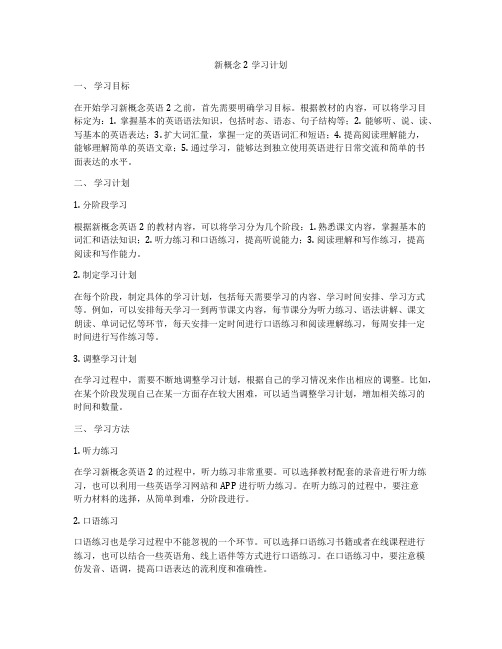
新概念2学习计划一、学习目标在开始学习新概念英语2之前,首先需要明确学习目标。
根据教材的内容,可以将学习目标定为:1. 掌握基本的英语语法知识,包括时态、语态、句子结构等;2. 能够听、说、读、写基本的英语表达;3. 扩大词汇量,掌握一定的英语词汇和短语;4. 提高阅读理解能力,能够理解简单的英语文章;5. 通过学习,能够达到独立使用英语进行日常交流和简单的书面表达的水平。
二、学习计划1. 分阶段学习根据新概念英语2的教材内容,可以将学习分为几个阶段:1. 熟悉课文内容,掌握基本的词汇和语法知识;2. 听力练习和口语练习,提高听说能力;3. 阅读理解和写作练习,提高阅读和写作能力。
2. 制定学习计划在每个阶段,制定具体的学习计划,包括每天需要学习的内容、学习时间安排、学习方式等。
例如,可以安排每天学习一到两节课文内容,每节课分为听力练习、语法讲解、课文朗读、单词记忆等环节,每天安排一定时间进行口语练习和阅读理解练习,每周安排一定时间进行写作练习等。
3. 调整学习计划在学习过程中,需要不断地调整学习计划,根据自己的学习情况来作出相应的调整。
比如,在某个阶段发现自己在某一方面存在较大困难,可以适当调整学习计划,增加相关练习的时间和数量。
三、学习方法1. 听力练习在学习新概念英语2的过程中,听力练习非常重要。
可以选择教材配套的录音进行听力练习,也可以利用一些英语学习网站和APP进行听力练习。
在听力练习的过程中,要注意听力材料的选择,从简单到难,分阶段进行。
2. 口语练习口语练习也是学习过程中不能忽视的一个环节。
可以选择口语练习书籍或者在线课程进行练习,也可以结合一些英语角、线上语伴等方式进行口语练习。
在口语练习中,要注意模仿发音、语调,提高口语表达的流利度和准确性。
3. 阅读理解阅读理解是学习英语的重要环节之一,可以选择一些简单的英语文章、故事书、英语新闻等进行阅读练习。
在阅读理解练习中,要注意词汇量的积累,理解文章的主题和要点,提高阅读速度和理解能力。
一年级新概念学习计划

一年级新概念学习计划学习计划目的1. 提升学生的基础知识和技能。
2. 培养学生的学习兴趣和学习动力。
3. 帮助学生建立正确的学习方法和习惯。
学习计划内容一、英语1. 学习内容(1)艾威尔绘本故事学习(2)单词拼读(3)句型造句(4)听力训练2. 学习方法(1)听说读写,全面提高语言能力。
(2)多接触英语环境,提高语言输入。
(3)和同学一起练习口语,提高语言表达能力。
3. 学习目标(1)能够熟练掌握50个基础单词。
(2)能够进行简单的英语对话交流。
(3)能够听懂简单的英语故事和短文。
二、数学1. 学习内容(1)数的认识和计数(2)加法和减法(3)分数概念(4)数学游戏2. 学习方法(1)多做实际操作,加强数学概念的理解。
(2)学会用游戏的方式进行数学学习。
(3)和同学一起讨论和解决数学问题。
3. 学习目标(1)能够熟练掌握1-100的数字,并能够正确写出。
(2)能够进行简单的加减法计算。
(3)能够理解分数的基本概念和运用方法。
三、科学1. 学习内容(1)基本植物和动物的认识(2)季节变化和天气的认识(3)物体的特性和材料的认识2. 学习方法(1)多做实验,观察实物进行科学探究。
(2)多进行户外活动,观察自然界的现象和规律。
(3)引导学生提出问题,自主探究解决方法。
3. 学习目标(1)能够认识常见的植物和动物,了解它们的特点。
(2)能够理解季节变化和天气变化的原因。
(3)能够观察物体的特性,认识常见的材料。
四、音乐1. 学习内容(1)声音的产生和传播(2)乐器的认识(3)歌曲的学习和演唱2. 学习方法(1)多进行声音实验,了解声音的产生和传播原理。
(2)多进行音乐欣赏,认识不同乐器的声音和特点。
(3)多进行歌曲的学习和演唱,提高音乐表达能力。
3. 学习目标(1)能够认识声音的产生和传播的原理。
(2)能够认识常见的乐器,了解它们的声音和特点。
(3)能够学唱5首带有意义的歌曲。
五、美术1. 学习内容(1)基本图形和颜色的认识(2)手工制作(3)素描和彩绘2. 学习方法(1)多进行素描和彩绘练习,提高绘画技巧。
新概念二册学习计划
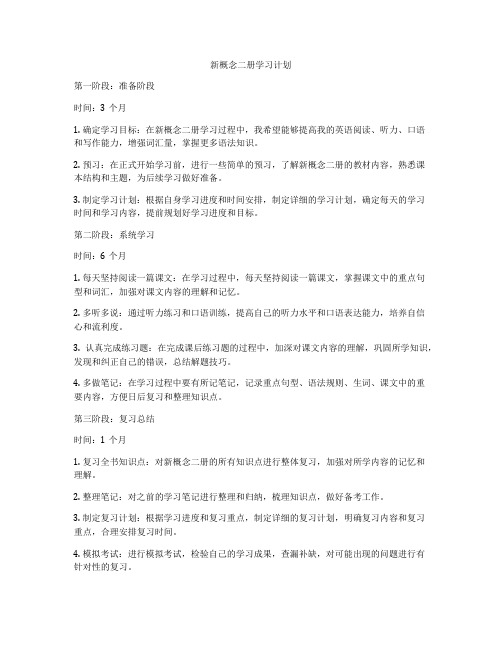
第一阶段:准备阶段时间:3个月1. 确定学习目标:在新概念二册学习过程中,我希望能够提高我的英语阅读、听力、口语和写作能力,增强词汇量,掌握更多语法知识。
2. 预习:在正式开始学习前,进行一些简单的预习,了解新概念二册的教材内容,熟悉课本结构和主题,为后续学习做好准备。
3. 制定学习计划:根据自身学习进度和时间安排,制定详细的学习计划,确定每天的学习时间和学习内容,提前规划好学习进度和目标。
第二阶段:系统学习时间:6个月1. 每天坚持阅读一篇课文:在学习过程中,每天坚持阅读一篇课文,掌握课文中的重点句型和词汇,加强对课文内容的理解和记忆。
2. 多听多说:通过听力练习和口语训练,提高自己的听力水平和口语表达能力,培养自信心和流利度。
3. 认真完成练习题:在完成课后练习题的过程中,加深对课文内容的理解,巩固所学知识,发现和纠正自己的错误,总结解题技巧。
4. 多做笔记:在学习过程中要有所记笔记,记录重点句型、语法规则、生词、课文中的重要内容,方便日后复习和整理知识点。
第三阶段:复习总结时间:1个月1. 复习全书知识点:对新概念二册的所有知识点进行整体复习,加强对所学内容的记忆和理解。
2. 整理笔记:对之前的学习笔记进行整理和归纳,梳理知识点,做好备考工作。
3. 制定复习计划:根据学习进度和复习重点,制定详细的复习计划,明确复习内容和复习重点,合理安排复习时间。
4. 模拟考试:进行模拟考试,检验自己的学习成果,查漏补缺,对可能出现的问题进行有针对性的复习。
时间:1个月1. 针对性复习:根据模拟考试中的得分情况,针对性地复习相对薄弱的知识点,认真攻克难点。
2. 多做真题:多做真题,熟悉考试题型和考试时间,提高答题速度和准确度。
3. 合理安排作息和饮食:保持良好的作息和饮食习惯,保持良好的精神状态和体力状态。
通过以上的学习计划,我将全面系统地学习新概念二册,提高我的英语水平,为未来的学习和工作打好坚实的基础。
新概念英语一学习计划
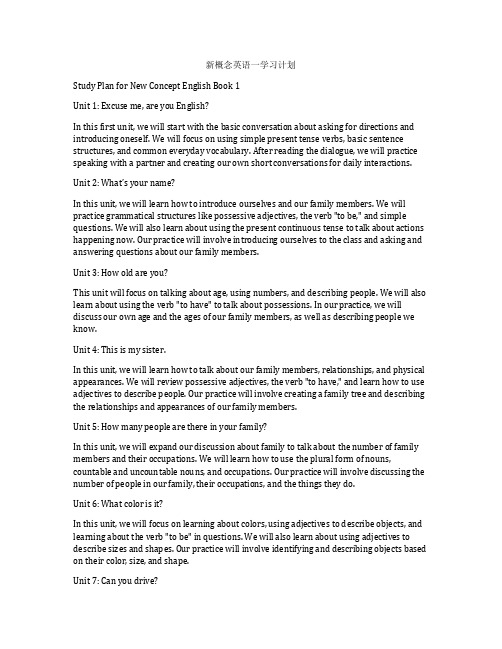
新概念英语一学习计划Study Plan for New Concept English Book 1Unit 1: Excuse me, are you English?In this first unit, we will start with the basic conversation about asking for directions and introducing oneself. We will focus on using simple present tense verbs, basic sentence structures, and common everyday vocabulary. After reading the dialogue, we will practice speaking with a partner and creating our own short conversations for daily interactions.Unit 2: What’s your name?In this unit, we will learn how to introduce ourselves and our family members. We will practice grammatical structures like possessive adjectives, the verb "to be," and simple questions. We will also learn about using the present continuous tense to talk about actions happening now. Our practice will involve introducing ourselves to the class and asking and answering questions about our family members.Unit 3: How old are you?This unit will focus on talking about age, using numbers, and describing people. We will also learn about using the verb "to have" to talk about possessions. In our practice, we will discuss our own age and the ages of our family members, as well as describing people we know.Unit 4: This is my sister.In this unit, we will learn how to talk about our family members, relationships, and physical appearances. We will review possessive adjectives, the verb "to have," and learn how to use adjectives to describe people. Our practice will involve creating a family tree and describing the relationships and appearances of our family members.Unit 5: How many people are there in your family?In this unit, we will expand our discussion about family to talk about the number of family members and their occupations. We will learn how to use the plural form of nouns, countable and uncountable nouns, and occupations. Our practice will involve discussing the number of people in our family, their occupations, and the things they do.Unit 6: What color is it?In this unit, we will focus on learning about colors, using adjectives to describe objects, and learning about the verb "to be" in questions. We will also learn about using adjectives to describe sizes and shapes. Our practice will involve identifying and describing objects based on their color, size, and shape.Unit 7: Can you drive?In this unit, we will learn about talking about abilities, using can and can’t, and expressing likes and dislikes. We will also learn about expressing preferences using would like. Our practice will involve discussing our own abilities, likes and dislikes, and what we would like to do in the future.Unit 8: Please come to dinner.In this unit, we will learn about making invitations, using polite language, and expressing gratitude. We will also learn about using the present continuous tense to talk about future arrangements. Our practice will involve inviting classmates to various activities and responding politely to invitations.Unit 9: How do you like it here?In this unit, we will learn how to talk about places and express opinions. We will learn about using adverbs of frequency, such as always, usually, and never. Our practice will involve discussing places we like to visit, how often we visit them, and what we like to do there.Unit 10: What’s the weather like?In this unit, we will learn about talking about the weather and using the present continuous tense to talk about future plans. We will also learn about using adjectives to describe the weather. Our practice will involve discussing the weather in different seasons and making plans based on the weather forecast.In addition to studying the New Concept English Book 1, we will also incorporate other resources and activities to enhance our learning experience. These resources may include: - Watching and listening to English TV shows, movies, and music- Practicing speaking and listening with a language exchange partner- Using language learning apps and websites for additional practice and reinforcement- Participating in group discussions and language learning communities- Keeping a daily journal in English to practice writing and expressing thoughts and ideasBy following this comprehensive study plan and utilizing additional resources, I believe that I will be able to effectively improve my English skills and confidently communicate in English. I am committed to dedicating time and effort to my English studies and am excited to see the progress I will make by following this plan.。
新概念英语0基础学习计划

新概念英语0基础学习计划For individuals with zero knowledge of English, starting with the New Concept English series can be a daunting but rewarding journey. This learning plan aims to provide a step-by-step guide for beginners to gradually build their English proficiency using the New Concept English series.Week 1-2: Getting StartedDuring the first two weeks, the focus will be on familiarizing oneself with the basics of the English language. This includes learning the English alphabet, practicing simple greetings, and introducing oneself. The New Concept English textbook "First Things First" is an ideal resource to start with. It covers fundamental vocabulary, basic grammar, and essential phrases to help beginners get comfortable with the language.Week 3-4: Building VocabularyIn the following two weeks, the emphasis will be on expanding vocabulary. The second book in the series, "Practice and Progress," provides a range of vocabulary exercises and activities for learners to develop their word bank. Learners can start by learning common everyday words, such as numbers, colors, food, and clothing. Using flashcards, vocabulary games, and daily practice, learners can gradually build their vocabulary base.Week 5-6: Grammar EssentialsAs learners start to gain confidence in their vocabulary, it's time to focus on basic grammar. "Practice and Progress" also introduces grammar concepts in a simple and accessible way, making it suitable for beginners. Learners can start with verb tenses, sentence structure, and basic question formation. Practice exercises and drills are essential to reinforce understanding and application.Week 7-8: Listening and SpeakingTo improve listening and speaking skills, "The New Concept English 1" audio CD can be utilized. Listening to the dialogues and conversations in the CD will help learners become familiar with English pronunciation and intonation. Pairing up with a language partner or joining a language exchange group can provide opportunities for real-life conversation practice.Week 9-10: Reading ComprehensionThe "New Concept English 2" book provides reading passages and comprehension exercises that are suitable for beginners. Reading short stories, articles, and dialogues will help learners improve their reading comprehension, and expand their understanding of sentence structures and vocabulary in context.Week 11-12: Writing SkillsThe final weeks will focus on building writing skills. "New Concept English 2" includes writing exercises that cover basic sentence construction, paragraph writing, and simple essay structures. Additionally, learners can practice writing diary entries, short emails, and personal narratives to further develop their written communication skills.In addition to the above, consistent practice, exposure to English media (movies, TV shows, music), and seeking out opportunities to use English in real-life situations will greatly enhance the learning process. Engaging with the language daily, even for a short period of time, is crucial for solidifying language skills.Finally, setting specific, measurable, achievable, relevant, and time-bound (SMART) goals will help learners stay motivated and track their progress throughout the learning journey. In conclusion, the New Concept English series provides a systematic and effective approach for beginners to learn English from scratch. By following this 12-week learning plan and incorporating consistent practice and immersion, beginners can make significant strides in their English language proficiency.。
新概念英语学习周计划

新概念英语学习周计划IntroductionNew Concept English is a popular and effective English learning course developed by Louis George Alexander. It is widely used by learners of English as a second language due to its clear and practical approach to language learning. This study plan is designed to help learners make the most of their time and resources while studying New Concept English.Day 1: Introduction to New Concept EnglishOn the first day, it is important to familiarize yourself with the structure and content of New Concept English. Spend some time reading the introduction and overview of the course. Pay special attention to the learning objectives and study methods recommended by the author. Take note of any important tips or advice that will help you make the most of your study time.After reading the introduction, spend some time browsing through the course materials. Look at the table of contents and get a sense of the topics and lessons that are covered in the course. Take note of any areas that you feel particularly interested in or need to focus on. Day 2: Setting Study GoalsOn the second day, take some time to set your study goals for the week. Think about what you hope to achieve by the end of the week, and what specific areas of English you want to improve. This could include improving your listening and speaking skills, expanding your vocabulary, or mastering specific grammar points. Write down your study goals and keep them in a visible place as a reminder of what you are working towards.Day 3: Listening PracticeNew Concept English includes a strong focus on listening skills, which are essential for effective communication in English. On the third day, spend some time practicing your listening skills. You can do this by listening to the audio recordings that accompany the course materials. Pay close attention to the pronunciation, intonation, and rhythm of the speakers, and try to mimic their speech patterns. You can also listen to English podcasts or news broadcasts to further improve your listening skills.Day 4: Reading and ComprehensionReading is an important part of language learning, and New Concept English provides a variety of reading materials to help learners improve their reading comprehension skills. On the fourth day, spend some time reading through the course materials. Pay attention to the vocabulary, sentence structure, and overall meaning of the passages. Challenge yourself by reading articles or stories outside of the course materials to further develop your reading skills.Day 5: Speaking PracticeEffective communication in English requires strong speaking skills. On the fifth day, spend some time practicing your speaking skills. You can do this by engaging in conversations with native English speakers, participating in language exchange programs, or simply practicing speaking aloud on your own. Focus on using the vocabulary and grammar points that you have learned from New Concept English, and try to speak as fluently and confidently as possible.Day 6: Writing PracticeWriting is another important skill to develop when learning a new language. On the sixth day, spend some time practicing your writing skills. You can do this by writing short essays, diary entries, or even just jotting down your thoughts in English. Pay attention to your grammar, spelling, and overall structure of your writing, and review the materials from New Concept English to help improve your writing skills.Day 7: Review and ReflectionOn the final day of the week, take some time to review and reflect on your progress. Look back at your study goals and assess how much you have achieved. Consider what areas you have improved in, and what areas you still need to work on. Reflect on the study methods and strategies that have worked well for you, and think about how you can continue to improve in the future.ConclusionBy following this study plan, you can make effective use of your time and resources to improve your English language skills with New Concept English. Remember to stay motivated and dedicated to your learning goals, and don't be afraid to seek out additional resources and support to help you along the way. With persistence and effort, you can make significant progress in your English language learning journey.。
新概念学习周计划
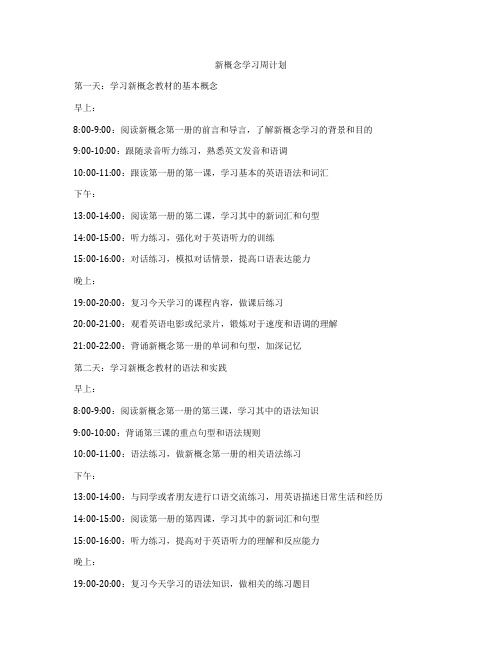
新概念学习周计划第一天:学习新概念教材的基本概念早上:8:00-9:00:阅读新概念第一册的前言和导言,了解新概念学习的背景和目的9:00-10:00:跟随录音听力练习,熟悉英文发音和语调10:00-11:00:跟读第一册的第一课,学习基本的英语语法和词汇下午:13:00-14:00:阅读第一册的第二课,学习其中的新词汇和句型14:00-15:00:听力练习,强化对于英语听力的训练15:00-16:00:对话练习,模拟对话情景,提高口语表达能力晚上:19:00-20:00:复习今天学习的课程内容,做课后练习20:00-21:00:观看英语电影或纪录片,锻炼对于速度和语调的理解21:00-22:00:背诵新概念第一册的单词和句型,加深记忆第二天:学习新概念教材的语法和实践早上:8:00-9:00:阅读新概念第一册的第三课,学习其中的语法知识9:00-10:00:背诵第三课的重点句型和语法规则10:00-11:00:语法练习,做新概念第一册的相关语法练习下午:13:00-14:00:与同学或者朋友进行口语交流练习,用英语描述日常生活和经历14:00-15:00:阅读第一册的第四课,学习其中的新词汇和句型15:00-16:00:听力练习,提高对于英语听力的理解和反应能力晚上:19:00-20:00:复习今天学习的语法知识,做相关的练习题目20:00-21:00:观看英语新闻,提高对于英语表达的实践和应用21:00-22:00:背诵新概念第一册的单词和句型,巩固记忆第三天:学习新概念教材的阅读和写作早上:8:00-9:00:阅读新概念第一册的第五课,学习其中的阅读理解和写作技巧9:00-10:00:写作练习,按照第五课的要求进行写作练习10:00-11:00:对话练习,模拟对话情景,提高口语表达能力下午:13:00-14:00:阅读第一册的第六课,学习其中的新词汇和句型14:00-15:00:写作练习,按照第六课的要求进行写作练习15:00-16:00:听力练习,提高对于英语听力的理解和反应能力晚上:19:00-20:00:复习今天学习的阅读和写作技巧,做相关的练习题目20:00-21:00:观看英语剧集或电影,提高对于英语表达的实践和应用21:00-22:00:背诵新概念第一册的单词和句型,巩固记忆第四天:学习新概念教材的综合应用早上:8:00-9:00:阅读新概念第一册的第七课,学习其中的综合语言知识9:00-10:00:对话练习,模拟对话情景,提高口语表达能力10:00-11:00:语法综合练习,强化对于语法知识的理解和运用下午:13:00-14:00:阅读第一册的第八课,学习其中的新词汇和句型14:00-15:00:语法练习,巩固对于英语语法的理解和应用15:00-16:00:听力练习,提高对于英语听力的理解和反应能力晚上:19:00-20:00:复习今天学习的课程内容,做综合练习题目20:00-21:00:与同学或者朋友进行口语交流练习,用英语描述日常生活和经历21:00-22:00:观看英语电影或纪录片,锻炼对于速度和语调的理解第五天:总结与复习早上:8:00-9:00:复习新概念第一册的所有课程内容,针对性地进行知识巩固9:00-10:00:背诵新概念第一册的单词和句型,加深记忆10:00-11:00:总结新概念第一册的学习经验和感悟下午:13:00-14:00:综合练习,进行模拟考试,检验学习效果14:00-15:00:总结课程内容,解决课程中的难点和疑问15:00-16:00:自由学习,挑选喜欢的英语学习书籍进行阅读晚上:19:00-20:00:观看英语节目或者新闻,提高对于英语表达的实践和应用20:00-21:00:与同学或者朋友进行口语交流练习,用英语描述日常生活和经历21:00-22:00:背诵新概念第一册的单词和句型,巩固记忆通过以上的学习周计划,我们能够全面提升新概念教材的学习效果,同时也能够在学习中提高学习激情和自主学习能力。
- 1、下载文档前请自行甄别文档内容的完整性,平台不提供额外的编辑、内容补充、找答案等附加服务。
- 2、"仅部分预览"的文档,不可在线预览部分如存在完整性等问题,可反馈申请退款(可完整预览的文档不适用该条件!)。
- 3、如文档侵犯您的权益,请联系客服反馈,我们会尽快为您处理(人工客服工作时间:9:00-18:30)。
新概念英语学习计划表怎么写导读:我根据大家的需要整理了一份关于《新概念英语学习计划表怎么写》的内容,具体内容:在当今社会英语越来越重要,所以学好英语很有必要。
那么呢?以下是我分享给大家的新概念英语学习计划,希望可以帮到你!新概念英语学习计划听课要求1.在听课前,请预先准备好必备教材...在当今社会英语越来越重要,所以学好英语很有必要。
那么呢?以下是我分享给大家的新概念英语学习计划,希望可以帮到你!新概念英语学习计划听课要求1.在听课前,请预先准备好必备教材:《新概念》第一册(推荐使用新版学生用书)及配套磁带、《新概念第一册练习册》;学习专用笔记本;2.在高强度的课堂讲解的基础上,要求学员需要花费超过课堂的时间来认真完成课程的学习,并做好详细的课堂笔记,以方便日后的复习;3.每篇课文的课后练习需要严格按照要求完成,以保证巩固听课效果。
第1周1.熟悉音标、有意识地自觉培养对音标的敏感度,如音标的认识、拼读等;2.课堂的课程组成、课程介绍、学习指导,特别是其中的有关新概念一册的内容;3.在参看学习指导,预习课堂前三课老师要讲的教材内容;4.重点掌握语音基本知识;5.根据实际情况,拟定学习计划书,有目标、有步骤地学习。
第2~19周听课要求1.课前预习要求能够背诵下一课的生词并复习上一课的单词;2.根据录音朗读课文,每天至少坚持1个小时以上;3.完成教材的课后练习,不懂部份及时向老师反映解决;4.完成教师要求的背诵内容;5.根据阶段性测试,巩固每个阶段学习效果;6.课堂上要积极参与对话,锻炼自己的口语。
备注1.新概念第一册主要巩固了英语中基础部份的内容,并且强化了英语发音的准确性,因此不论学员在学习前的英语水平如何都能在本课中受益。
2.新概念第一册是学习英语的敲门砖,总共有144课,其中单数课是对话,双数课是单数课重点句型的重复操练,同时会出现部分新的知识点;3.在整个学习过程中,建议安排阶段复习后,再进入下面的课程学习以便巩固学习成果;学生要积极与老师配合,达到听与说的能力;4.全部课程约束之后,安排时间进行总复习,根据课堂笔记,复习重点内容;5.掌握英语日常用语,以及英语一些基本的表达方法、语法结构、单词、简单口语。
6.新概念英语一至四册是一套完整的教学体系,建议你在学好第一册后,继续学习第二、三、四册的课程。
第一册以英文26个字母为起点,讲解48个音标、基本的语音知识及最基本的语法知识。
本课程讲解的词汇,首先是书上单词表列出的单词879个,然后是对话练习教师上课补充的单词总共1000个左右。
如果完全掌握,词汇量在1800个左右,相当于中学初中三年高中第一学期左右水平。
词汇是新概念特色词汇,但核心词汇和学校一样。
第一册讲解的语法有:1.基本时态(一般现在时、一般过去时、现在进行时、一般将来时、现在完成时、过去进行时、过去完成时等,基本的用法会讲到)。
2.句子(陈述句、否定句、一般疑问句、特殊疑问句、反意疑问句,否定疑问句、选择疑问句、感叹句、简单倒装句)。
3.从句:宾语从句(重点讲解)、时间状语从语(一般讲解)、限定性定语从句(重点讲解)、真实条件句(重点讲解)。
4.其他语法:动词不定式(作宾语、宾语补足语、后置定语、目的状语)、形容词的基本用法、副词的种类及用法、各种人称代词及用法、情态动词表示推测和判断的用法、常见情态的动词用法,名词的分类及用法、句型、简单省略句、表语从句、直接引语和间接引语、从宾语的用法、宾语补足语、形容词的比较级最高级,同级比级、较低较高比较级、冠词的基本用法、不定代词的基本用法、被动语态等等。
《新概念英语》第二册学习计划听课要求1.认真作好课堂笔记,课堂笔记是系统复习的重要资料;2.每篇课文的课后练习需要严格按照要求完成,以保证听课效果;3.尽可能抽时间做配套的练习册,巩固所学知识。
第1周1.新概念英语第一册词汇为857个,自我检查词汇量是否到要求。
如果已经达到要求可以直接进入课堂第二册学习,否则,需要安排1周时间背诵词汇(可结合背诵四级词汇),作好听课前的准备。
2.根据教材给出的测试题,作一个自我测试,了解自己在听说读写四方面的能力:(1)整体能力是否已经达到学习要求;(2)对四方面能力的强弱做到心中有数,学习过程中加大对弱项的训练。
第2-19周听课要求1.课前预习要求能够背诵下一课的生词并复习上一课的单词;结合上课语法要求、关键词组,能复述文章大意;2.根据录音朗读课文,每天至少坚持1个小时以上;3.完成教材要求的课后练习,不懂部分及时向老师反映解决;4.完成老师要求的背诵内容,并根据磁带听写课文内容;5.掌握老师教授的基本语法以及词汇、短语的用法;6.课堂上要踊跃发言,让老师有机会给您纠正错误,有助于提高口语水平。
备注1.第25、55课时的学习完成后,建议安排阶段复习;2.全部课时结束之后,安排时间进行总复习,根据课堂笔记,复习重点内容;3.教材第4单元课文的生词和语法已在前面课程中通过同义、近义和类似的联想教学作出了讲解。
据统计,新概念教材第二册词汇量为1126个,而课堂实际要求掌握的词汇则达到了3000个;4.第二册学员应在40课以后听懂纯英文授课,能进行简单的书信写作,在听、说、读、写方面水平显著提高;5.完成新概念英语第二册学习内容的学员可以通过针对性的考试技巧培训参加大学英语四级考试。
新概念英语第二册是学习英语的基础阶段,全书共有96课,每篇课文以150个单词左右的小故事组成。
课文故事性强,易于学习。
每篇课文重点、语法知识点各异,但全册课文前后连贯,语法知识全面,形成了新概念特有的英语语法体系。
新概念英语第二册书本出现的新单词大约1126个左右,加上教师上课补充的词汇,学生可以通过新概念二册的学习,词汇达到3000个左右,有了词汇为基础,学生课堂上认真听课,掌握老师讲解的语法知识、词汇用法,课后通过一定的应试练习训练就可以参加全国大学英语四级考试或相当水平的测试。
新概念二册讲解的语法点;1.进一步讲解时态,特别是分析各时态之间的区别。
如:一般将来时与一般将来进行时的区别与联系。
2.句子:重点讲解复合名,特别是句子与句子之间的关系,如并列关系、转折关系、递进关系,因果关系等。
特殊句型如:反问句、强调句,it作为形式主语或形式宾语句型。
3.从句:重点讲解定语从句,同位语从句和状语从句;主语从句和表语从句比较简单,学生较易掌握。
老师在讲解各从句时,必须详细分析它们之间的不同点,防止学生混淆。
4.非谓语动词是二册学习的重点,也是难点,非谓语动词包括动词不定式,分词结构(现在分词过去分词),动名词,独立主格结构;老师在讲解非谓语动词时不但要把它们单独的用法讲清,而且还要分析它们之间的联系与区别,经及与从句之间的互换。
5.虚拟语气:虚拟语气结构比较复杂,因此学生在学习过程中容易混淆,老师大量引用例子,详细讲解。
由于虚拟语气中有很多要靠学生死记硬背的语法条条框框,老师用比较有代表情的例句,防止学生产生厌学心理。
6.倒装与省略:倒装是英语比较常见的现象,教师要说明全倒装、部分倒装的用法;省略现象在英语中也较常见,教师适当为学生总结归纳。
7.介词与连词:重点讲解常用介词与连词的基本用法,特别是介词与动词的搭配结构;连词要重点陈述,连词在句子中体现的逻辑关系。
8.被动语态的各个时态。
9.情态动词的用法及它们之问的区别与联系。
《新概念英语》第三册学习计划听课要求1.认真作好课堂笔记,课堂笔记是系统复习的重要资料;2.每篇课文的课后练习需要严格按照要求完成,以保证听课效果;3.第三册的练习册,是按照国际标准的考试系统统计的,学员应抽时间,巩固所学知识。
第1周1.新概念英语第一册词汇为857个,第二册1126个自我检查词汇量是否达到要求。
如果已经达到要求可以直接进入第三册的学习,否则,需要安排1周时间背诵词汇(建议结合大学六级词汇),作好听课前的准备;2.根据教材给出的测试题,作一个自我测试工,了解自己在听说读写四方面的能力:(1)整体能力是否已经达到了学习要求;(2)对四方面能力的强弱做到心中有数,学习过程中加大对弱项的练习。
第2-19周听课要求1.课前预习要求能够背诵下一课的生词并复习上一课单词;2.根据录音朗读课文,每天至少坚持2个小时以上;3.完成教材的课后练习,不懂部份及时向老师反映解决;4.完成教师要求的背诵内容,听磁带、听写文章精彩段落;5.开始学习初步的写作、翻译;6.学习英语地道表达方法、增强语言感觉能力,能用"英语思维"思考问题。
备注1.第三册学员应听懂纯英文课,听、说、读、写水平进一步强化;2.第19、37课时的学习完成后,建议安排阶段学习;3.全部课程约束之后,安排时间进行总复习,根据课堂笔记,复习重点内容;4.完成新概念英语第三册学习的学员可以通过针对性的考试技巧的培训,参加大学英语六级、研究生入学考试、雅思和托福考试等。
新概念英语第三册是学习英语的提高阶段,全书共有60课,每篇课文比第二册课文要长得多,大约平均每篇300字左右。
课文还是以故事体的记人叙事为主,但第三册课文中也包含了一些日常生活紧密相连的说明文和少量的散文。
第三册主要全面提高学生的听、说、读、写的能力。
新概念英语第三册出现新单词大约1900个左右,加上教师上课补充的词汇,学生可以掌握3000个左右的新单词,因此学生在学习完第三册后词汇可以达到6000个左右,经过一定的训练可以参加全国大学英语六级或相当水平的测试。
新概念英语第二册已把语法的框框条条与课文内容联系起来分析语法现象,注重语法的应用。
教师分析文章注重分析段落关系、文章结构、用词风格以及作考的写作技巧,使学生慢慢地从字、句学习转移到段落、篇章的学习。
听力从原来的小对话发展到多听100字左右的小短文,学生要在听完1-2遍后可以大体了解文章大意。
口语要从简单的日常用语发展到对事物陈述自己的观点,表达自己的看法。
写作是第三册的教学重点,教师讲解英文文体的写作特征,如记叙文要包括(who,what,when,where,how,why)等要素,说明文的一般结构(如总分结构),议论文的写作方法,如对比法写作、分类法写作、例证写作......《新概念英语》第四册学习计划听课要求1.认真作好课堂笔记,课堂笔记是系统复习的重要资料;2.每篇课文的课后练习需要严格按照要求完成,以保证听课效果;3.第四册的练习册是按照国际标准的考试系统来设计的,学员应抽时间完成,巩固所学知识.第1周1.新概念英语第一册词汇为857个,第二册为1126个,第三册为1908个,自我检查词汇量是否达到要求,如果已经达到要求可以直接进入第四册的学习,否则,需要安排1周时间背诵词汇,作好听课前的准备;2.根据教材给出的测试题,作一个自我测试,了解自己在听说读写四方面的能力;(1)整体能力是否已经达到学习要求;(2)对四方面能力的强弱做到心中有数,学习过程中加大对弱项的训练。
